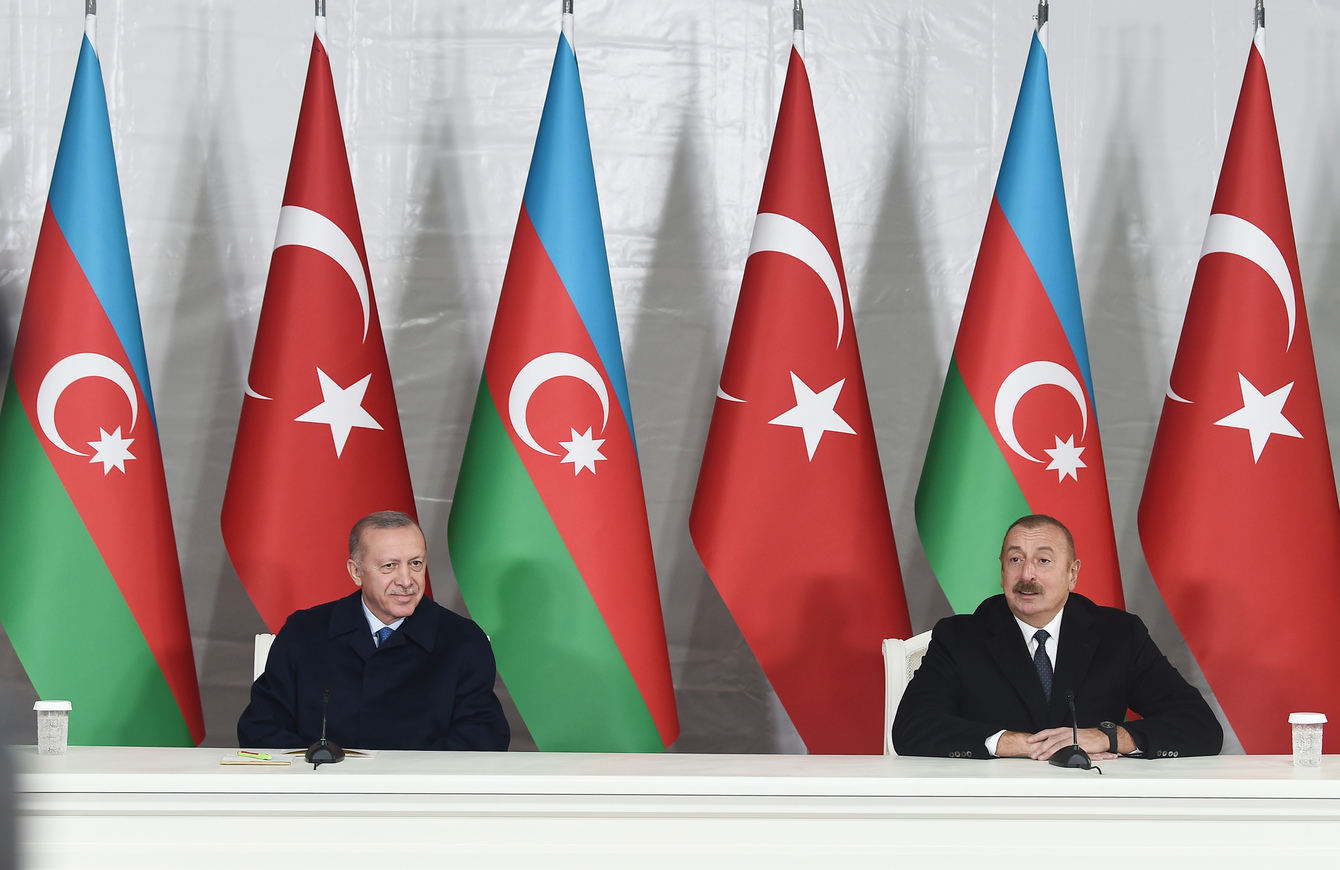Turkey and Armenia will have no obstacles to restoring ties if Yerevan shows goodwill towards Azerbaijan, President Recep Tayyip Erdogan said on Tuesday.
Turkish president made a statement during a joint press briefing with his Azerbaijani counterpart Ilham Aliyev in Zangilan — one of Azerbaijan’s districts liberated from the Armenian occupation last year.
While addressing the briefing, President Erdogan said Azerbaijan put an end to the occupation that impeded the realization of the region’s true potential. However, to implement multiple projects, which will turn the region into a transit and logistical center, determination and mutual recognition of borders between Armenia and Azerbaijan are necessary, the head of Turkey believes.
“Armenia should demonstrate sincere resolve in these issues to solve problems with Azerbaijan. If it shows goodwill towards Azerbaijan, then there will be no obstacles to the normalization of relations between Turkey and Armenia,” President Erdogan said on Tuesday.
“I would like to stress again that Turkey will also constructively respond to any positive step aimed at establishing lasting peace,” he added.
Turkey rejected diplomatic relations with Armenia due to its occupation of Azerbaijan’s Karabakh (Garabagh) region in the early 1990s. Ankara demanded a complete withdrawal of Armenian military forces from Azerbaijan as a precondition for resuming relations with Yerevan.
Armenia, in its turn, has long been urging the world community to hold Turkey accountable for the so-called self-invented “Armenian genocide” in the Ottoman Empire. The Turkish authorities have been rejecting these claims, calling for an open investigation into the figures claimed by Armenia and denying that a deliberate, systematic massacre against Armenians took place. The Armenian government adamantly rejected the proposal.
In addition, Armenians, in particular those in diaspora, have been making illegal claims to Turkish territories bordering Armenia. At the same time, Ankara has called for “respect to each other’s territorial integrity” as a basis for rapprochement with Armenia.
Meanwhile, some positive signals have gradually replaced the hostile rhetoric in Armenia-Turkey relations after last year’s 44-day war between Armenia and Azerbaijan.
Armenia and Azerbaijan have long been at odds over the latter’s Karabakh (Garabagh) region. Following the Soviet Union’s dissolution in 1991, Armenia launched a military campaign against Azerbaijan that lasted until a ceasefire deal was reached in 1994. As a result, Armenia occupied 20 percent of Azerbaijan’s internationally recognized territories. Over 30,000 ethnic Azerbaijanis were killed, and one million were expelled from those lands in a brutal ethnic cleansing policy carried out by Armenia.
On September 27, 2020, the decades-old conflict between the two countries spiraled after Armenia’s forces deployed in the occupied Azerbaijani lands shelled military positions and civilian settlements of Azerbaijan. During the counter-attack operations, Azerbaijani forces liberated over 300 settlements, including the cities of Jabrayil, Fuzuli, Zangilan, Gubadli and Shusha, from nearly 30-year-long illegal Armenian occupation. The war ended in a tripartite statement signed on November 10 by Armenia, Azerbaijan and Russia. Under the statement, Armenia also returned the occupied Aghdam, Kalbajar and Lachin districts to Azerbaijan.
Azerbaijani authorities have repeatedly said that the war fully ended the Armenia-Azerbaijan conflict.
After the 44-day war, the Turkish authorities have repeatedly called the region’s countries for joint work to achieve lasting peace in the South Caucasus. Ankara also called on Armenia to recognize territorial integrity of Azerbaijan and Turkey, as well as to put forward practical steps for peacebuilding and show goodwill to restore ties with Turkey.
In August 2021, President Erdogan said he was ready to take the necessary steps to thaw Turkey’s frozen relations with Armenia. Turkish presidential aide Ibrahim Kalin has later said that Ankara was “in principle, positive about normalization with Armenia.”
In a reciprocal statement in August 2021, Armenian Prime Minister Nikol Pashinyan said his country was ready “to create a mutual confidence between Ankara and Yerevan and continue our relations without preconditions.” The Armenian parliament has also sanctioned a five-year action plan “to make efforts to normalize relations with Turkey for the sake of stability, security, and the economic development of the region.”
The intentions of Turkey and Armenia to normalize relations will ensure long-term security and stability only if the process includes Azerbaijan, says Taras Kuzio, a professor of political science at the National University of Kyiv-Mohyla Academy in Ukraine.
Kuzio is convinced that before seeking rapprochement with Ankara, Armenia should sign a peace treaty with Azerbaijan and recognize the boundary between the two post-Soviet republics, as well as abandon the so-called 1915 genocide allegations and territorial claims against Turkey.







 Armenian sappers commenced on Monday mine-clearance operations in the territories adjacent to the Saint Mary Church in village of Voskepar (Armenia...
Armenian sappers commenced on Monday mine-clearance operations in the territories adjacent to the Saint Mary Church in village of Voskepar (Armenia...
 Iran and Pakistan have signed eight cooperation documents in various fields, and agreed to strengthen ties to fight terrorism in the region.
Iran and Pakistan have signed eight cooperation documents in various fields, and agreed to strengthen ties to fight terrorism in the region.
 President Aliyev emphasized the critical role of the North-South Transport Corridor in fostering transport cooperation between Azerbaijan and Russi...
President Aliyev emphasized the critical role of the North-South Transport Corridor in fostering transport cooperation between Azerbaijan and Russi...



